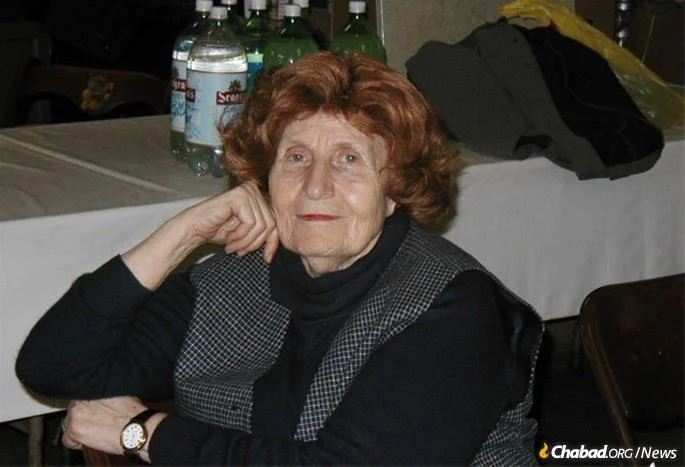
Obituary: Legendary Rebbetzin Chave Hecht, 95, Life-Long Woman of Action
by Mendel Super – chabad.org
In 1944, as a 17-year-old student at Thomas Jefferson High School in the Brownsville section of Brooklyn, N.Y., Chave Lasker took on an unusual responsibility. Coming from a materially impoverished but richly religious Jewish home, she volunteered to be an instructor for the newly-established Released Time program, teaching Jewish elementary-age public-school students for an hour each Wednesday. This was her first foray into Jewish education, and for the next nearly eight decades, she didn’t look back.
A year after her first teaching assignment, she married a brilliant and charismatic young rabbi, Yaakov Yehuda (J.J.) Hecht, and for the next eight decades, Rebbetzin Chava Hecht balanced raising her growing brood—and if 10 children weren’t enough, she adopted two more—with equally enormous communal commitments.
To generations of Jewish New Yorkers who knew her, she was known simply and reverently as Rebbetzin Hecht, and as the mother, grandmother, great-grandmother and great-great grandmother of some 500 descendants, as “Bubby Hecht.” Rebbetzin Hecht did not merely gain her title by marrying a rabbi, but rather by her own formidable achievements.
Rebbetzin Hecht, who passed away on Feb. 8, 2022 (7 Adar I, 5782) at the age of 95, never stopped working for the great Jewish causes to which she devoted her life.
Just last summer, the-then 94-year-old indefatigable overnight-camp director was still imparting instructions and advice to her staff—even after suffering a stroke three years earlier—as she’d done since she founded Camp Emunah girls’ camp in 1953, the second observant Jewish overnight camp for girls in the United States.
Childhood in Brooklyn’s Brownsville Neighborhood
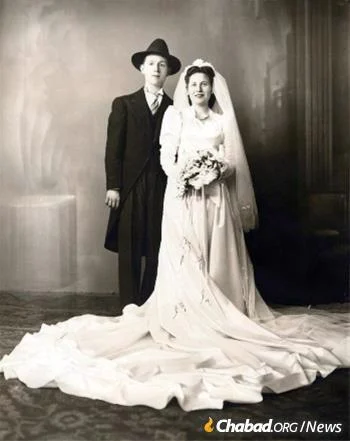
The oldest of three children, Chave Hecht was born in 1926 in the heavily Jewish neighborhood of Brownsville to Elimelech and Esther Leah Lasker, immigrants from Eastern Europe. During an era when many Jewish immigrants were coerced to compromise their faith in order to keep their jobs and support their families, her father clung to his faith and refused to work on Shabbat, which meant he would have to find a new job come Monday. “The first week he was sick, the second week he’d have another excuse, and by the third week, they realized he kept Shabbos and fired him,” Hecht’s son Rabbi Sholem Ber Hecht told Chabad.org.
Rebbetzin Hecht’s mother had grown up during World War I and did not receive Jewish schooling. She married at 16 and became a homemaker, and was especially delighted by her daughter’s Jewish learning, always asking her to share the mitzvot she’d learned at her after-school Talmud Torah class.
A student at Thomas Jefferson, a Brooklyn public school with a stellar reputation in the pre-war era, Chave excelled at mathematics while supplementing her Jewish education at Bais Yaakov of Brooklyn’s after-school seminary, the precursor to their first all-day girls’ school, which began in 1943.

In 1945, she married Rabbi J.J. Hecht, a boisterous, energetic and intensely dedicated American-born Chabad-Lubavitch Chassid who, as the director of the National Committee for the Furtherance of Jewish Education (NCFJE), was a key implementor of many initiatives of the Rebbe—Rabbi Menachem M. Schneerson, of righteous memory—and a New York Jewish institution until his passing in 1990. Rabbi Hecht, a renowned orator, ran a whirlwind of projects under the auspices of NCFJE—one of the first organizations under Chabad’s umbrella in America—aside from which he hosted a regular Jewish radio program on New York’s WEVD and served as a longtime pulpit rabbi.
The day of their marriage, the bride and groom had a yechidus (“private audience”) with the Sixth Rebbe—Rabbi Yosef Yitzchak Schneersohn, of righteous memory—a rare occurrence at the time, given the Sixth Rebbe’s weakened state. Rebbetzin Hecht would later credit that momentous audience with shaping her and her husband’s future life together. A year later when the couple had their first-born son, it was the Sixth Rebbe’s son-in-law and future successor—the Rebbe—who served as the sandek at the brit milah.
Following her marriage, Rebbetzin Hecht joined her husband in his work but also began initiating a host of programs on her own, especially those focused on women and girls.

The ‘Mother’ of the Camp
In the summer of 1952, while spending time in New York’s Catskills region, Rabbi and Rebbetzin Hecht visited Camp Agudah, an early Orthodox Jewish boys’ overnight camp. Chave Hecht, a passionate educator, was struck by the atmosphere of the camp’s joyous Shabbat meals and dreamed of creating a camp of her own.
They wrote to the Rebbe, and in the spring of 1953 received his approval and blessing for the project. Rebbetzin Hecht had found her niche. That summer, she opened Camp Emunah (today known as Camp Emunah Bnos Yaakov Yehudah), which has grown to serve 600 campers in six divisions each summer, including the Sunshine Circle division geared for girls with disabilities, set on more than 300 acres in Greenfield Park, N.Y.
From the beginning, Camp Emunah’s doors were opened to girls from across the Jewish spectrum, including those from religious and non-religious families, those who could pay tuition and those who could not. In the past seven decades, tens of thousands of girls have enjoyed an authentic Jewish summer experience at Camp Emunah.
Through it all, Rebbetzin Hecht ran the day-to-day camp operations alone; her husband’s synagogue didn’t allow him to leave for the summer. “She slept in her office,” recalls her eldest, Rabbi Sholem Ber Hecht, a Chabad emissary in Queens. “She had no secretary; if you called the camp at 7 a.m. or 10 p.m., she answered the phone.”

More than just a director, Rebbetzin Hecht had a relationship with each camper and staff member. She was the “mother” of the camp, says Rabbi Sholem Ber Hecht.
“She knew that camp is at the heart of a girl’s growth,” says Batya Krasnow (née Ingber), a childhood neighbor of the Hecht family. She interacted with the rebbetzin at their home, where she was friends with the Hecht kids, as well as at camp, which she first attended as an 8-year-old in 1973. At 14, Krasnow lost her father, and Rebbetzin Hecht invited Krasnow’s mother to be the “camp mother,” and Batya attended as a junior counselor. “She called me into her office on the first day of the summer to ask how I was managing,” recalls Krasnow. “You knew she wanted you to succeed. She was very on top of things, and she made you feel appreciated. She was generous with her praise but also sensitively pointed out areas that needed to be fixed, always with care.”
Speaking of Rebbetzin Hecht’s humility, Krasnow recalls how in the 1980s, the veteran camp director called her and asked Krasnow to visit her in Crown Heights, where she now lived. “She asked me for camp ideas. It was incredible that a woman with so much experience was asking me for my advice.”
Krasnow, who is the principal of the Torah Academy for Girls (TAG) school in Far Rockaway, N.Y., and herself a camp director for decades, credits Rebbetzin Hecht for giving her the foundation upon which she went on to build her own career in Jewish education. “So much of what I do started with my 10 years in Camp Emunah,” she says. Krasnow recalls one particular incident: “Rabbi Hecht had a radio show and would have the campers speak. One day, Rebbetzin Hecht told me it was my turn.” Nervous at first about speaking on the radio with the entire camp watching her, the girl’s fears were calmed by the rebbetzin. “Then I realized you don’t need to be nervous,” says Krasnow, adding that this episode remains with her until today, when addressing large crowds.
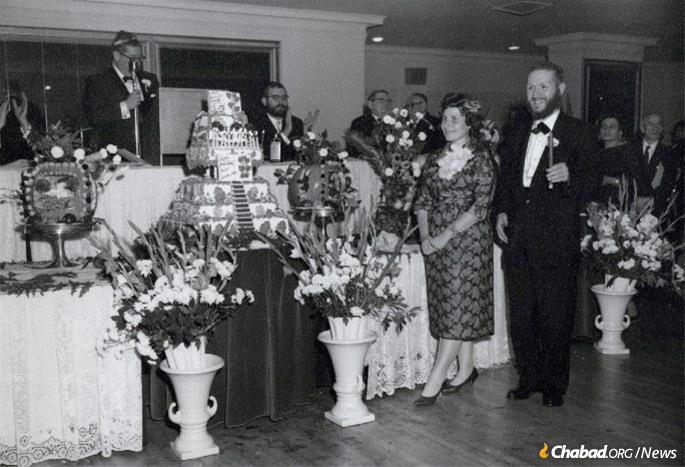
Active Leader of Women’s Causes
Rebbetzin Hecht was involved in Jewish education for women almost since the start. Even before marriage, she became the first teacher hired by the Beth Rivkah girls’ school in Brownsville. After she got married, she remained involved with the Released Time program, which was run under the auspices of NCFJE, and in the late 1940s and early ’50s she and her husband directed a summer day camp on Coney Island for these public school children, giving them a summer’s worth of Jewish education to makeup for the dearth of it during the year.
Rebbetzin Hecht was an early, active member of N’shei Chabad, the Chabad women’s organization. In 1975, she spearheaded the creation of Taharat Hamishpacha International, an initiative to bring the mitzvah and beauty of family purity and mikvah to the masses.
She also directed Toys for Hospitalized Children, an organization that distributes toys to sick children of all backgrounds and walks of life.
As a camp director, she accepted dozens of children each year on full and partial scholarships, which had a great impact on their lives.
One former camper told the Hecht children at the shivah (“mourning period”) visit this week that she came from an abusive home, and the 12 years she spent at Camp Emunah were a literal lifeline. She and her two sisters are healthy human beings today because of Rebbetzin Hecht, the woman told the Hecht children.

Rabbi and Rebbetzin Hecht forever maintained a close relationship with the Rebbe. When their son, Sholem Ber, was getting married in Australia in 1968, the Rebbe gave the Hechts instructions to meet with and address the Australian Jewish communities, adding that he wanted Rebbetzin Hecht to speak as well. When they asked what they should be speaking about, the Rebbe told them they would find out on their way. En route, presidential candidate Robert F. Kennedy was assassinated by Palestinian Sirhan Sirhan in what was a prominent display of violence abroad stemming from anti-Israel beliefs. The Hechts now knew what they’d be speaking about.

‘Generous With Everyone’
In 1947, the couple accepted the position as rabbi and rebbetzin of the largest congregation in East Flatbush, Congregation Yeshiva Meir Simcha Hakohen, which they led for the next 44 years.
The way the couple worked together also left an impact on Krasnow, who recalls them as “a dynamic duo.” Both strong-willed personalities, Krasnow noticed how they always managed to work as one. “They were two redheads, strongly opinionated and yet so respectful of one another.” Krasnow recalls how the Hecht home was always open to all. “You can’t imagine the kinds of people that came through there. She was the quintessential Jewish mother, generous with everyone.”
One of those people was Janet Afrah, a 14-year-old Iranian refugee. She arrived in New York in 1979 with the Chabad-led “Operation Exodus” that saw 1,800 Jewish children smuggled out of Iran as the country descended into authoritarianism. The operation was spearheaded by Rebbetzin Hecht’s husband, after their son, Rabbi Sholem Ber, spent two weeks in Tehran. Afrah and her 11-year-old sister came to New York alone, their parents still trying to furtively escape. The Afrahs, like most of the children, were graciously hosted by Crown Heights families.
“It wasn’t easy for them,” says Janet Afrah. “We came just weeks before Pesach,” when families were busy juggling holiday cooking and cleaning duties.
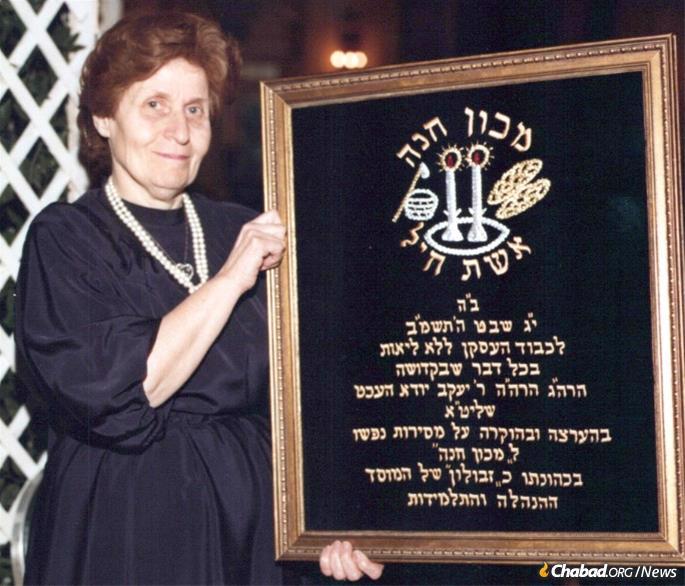
The Afrah sisters were hosted by an older couple on Kingston Avenue. They had one full-size bed for the two sisters, which Janet hastens to add “was fine for us.” But when word reached Rabbi Hecht that two girls were sharing a bed, Rebbetzin Hecht combed over the lists to try and place them in a more spacious setting. “She looked, and she said there’s no room anywhere,” recalls Afrah. Hecht had an almost empty home herself; most of her children were already out of the house. But she didn’t want to separate the Iranian girls from their group by taking them to East Flatbush. Seeing no other choice, she took them for the night while she tried to find a long-term solution.
“After a week, Rebbetzin Hecht turned to us and asked, ‘Do you like it here?’ ” Afrah remembers. “I said, ‘Yes, we love you.’ ‘We love you, too,’ she told us. And we stayed.”
“It was a short time, but inspiring and very helpful,” says Afrah. “She was an amazing lady. It was uplifting.” From day one, Afrah says, “she wanted us to feel very comfortable in her house. She was a mom of 12, but she didn’t mother us, ‘Do this, do that.’ She taught us by example; we watched how she lived and learned how to run a Jewish home. Outside she was Rebbetzin Hecht, but at home, she was very casual and sweet.
For a young 14-year-old, responsible for her sister and far away from home, it was an anxious time. “It was hard being away and not knowing if I’d ever see my parents again,” acknowledges Afrah. “Janet, think good and Hashem will send you good,” Rebbetzin Hecht would comfort her young charge. “With these words, she comforted me. I’m a grandmother of nine, and I still use these words. They may not be grammatically correct, but she used very small words for me to understand, and it went into my head.” The Rebbetzin’s comforting words weren’t merely hopeful; her husband was working hard to secure Afrah’s parents’ passage to New York. After six months, they finally made it, settling in Atlanta shortly afterwards.
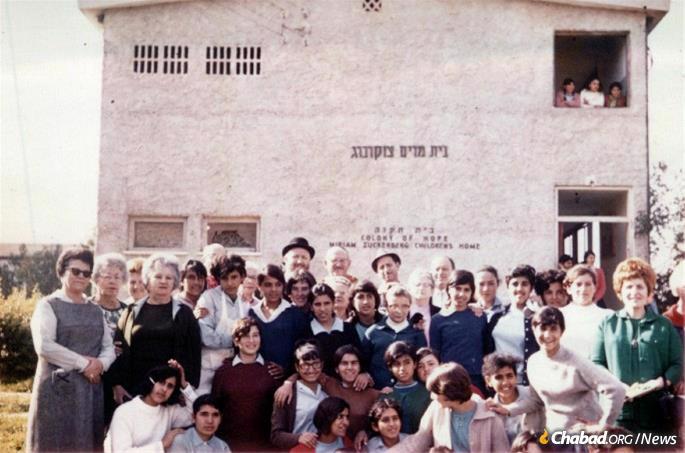
These days the owner of a Judaica store in Atlanta, Afrah nostalgically remembers the Hecht home of her childhood. Friday morning, “before we’d even wake up, the gefilte fish was boiling, the challah was coming out of the oven. I’ll never forget how she’d light her Shabbos candles. She had a magnificent leichter (‘candelabra’), and with heartfelt devotion she’d say the bracha and daven.” The young girl watched, transfixed. “I would say to myself, ‘Hashem, would I be able to do this someday?’ ”
When her parents arrived and took the girls to Atlanta, Rebbetzin Hecht did her research on the Jewish community there, making sure the children would be spiritually looked after. “She called the rabbi here and told us she’d checked it out, and it would be OK.” When Afrah got married, the Hechts flew down to celebrate with them. Rabbi Hecht officiated the wedding.
Years later, Afrah recalled to Chabad.org in 2019, “my son got married and Rebbetzin Hecht came with her son, who read the Rebbe’s letter of blessing for the wedding, the one he sent when I got married. Rebbetzin Hecht sat at the badeken [the ceremonial veiling], together with my mother. I have always said I have two sets of parents.” For her part, Rebbetzin Hecht found herself overcome with emotion: “I cried,” Rebbetzin Hecht told Chabad.org at the time.
“She was a beautiful person inside and out,” says Afrah. “Today, every time I worry, her voice rings in my ears: “Janet, think good and Hashem will send you good.”

In 2015, Rebbetzin Hecht was part of a Chabad delegation which met President Obama in the Oval Office to mark Education and Sharing Day, U.S.A., in honor of the birth date of the Rebbe. She came together with her great-granddaughter, Chaya Mushka Goldstein, 11, of Ann Arbor, Mich., a “general” in Tzivos Hashem, a children’s group established by the Rebbe in 1980.
Rebbetzin Hecht filled all her community roles because, more than anything else, she was a shlucha, an emissary of the Rebbe, and that’s how she lived her life. “That’s how he was. He jumped in, even if the water was freezing,” she described her husband’s communal dedication in 2019. How aptly did these words apply to Rebbetzin Hecht herself.
She is survived by her children: Rabbi Sholem Ber Hecht (Queens, N.Y.); Bassie Raskin (Brooklyn, N.Y.); Rabbi Yossie Hecht (Johannesburg, South Africa); Fraide Sabol (Greenfield Park, N.Y.); Rabbi Shea Hecht (Brooklyn, N.Y.); Dovid Sabol (Greenfield Park, N.Y.); Rivkie Abramowitz (Brooklyn, N.Y.); Chana Rochel Duchman (Los Angeles); Levi Hecht (Brooklyn, N.Y.); Rabbi Shimon Hecht (Brooklyn, N.Y.); Binie Tenenbaum (Irvine, Calif.); in addition to many grandchildren, great-grandchildren; and great-great grandchildren.
She was predeceased by her husband, Rabbi Yaakov Yehudah (J.J.) Hecht in 1990, and by their son, Gershon Sabol, in 2020.
She was also predeceased by her brother, Rabbi Tzvi Moshe Lasker of Kfar Chabad, Israel, who passed away in January.
She is also survived by her sister, Mrs. Tziporah Goldberg of Brooklyn, N.Y.
This article has been reprinted with permission from chabad.org

